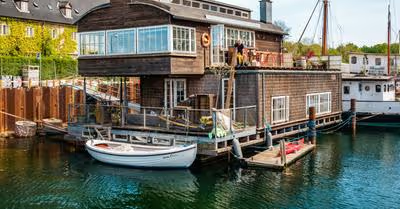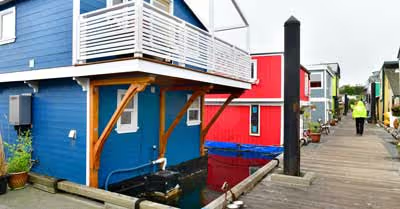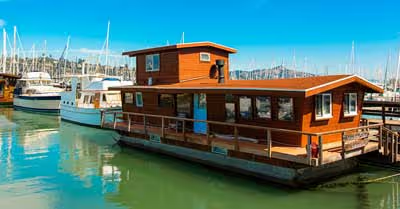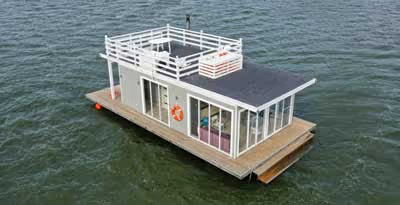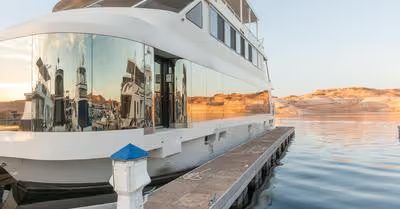
Buying, selling, and owning houseboats is an unconventional investment strategy, yet there are several ways to make it work long-term.
Houseboats can be a good investment under the right circumstances and with careful planning. The two primary ways of investing in houseboats are by flipping used vessels and buying one to use as a rental property or floating vacation home.
In this article, we'll go over several of the most common and proven ways to invest in houseboats. We'll also go over some of the costs and labor involved, along with alternative strategies to profit from houseboat ownership.
We sourced the information for this article from analyzing the used houseboat market along with the experiences of people who rent and sell houseboats for profit.
What’s a Good Boat Investment?
A good investment is an expenditure that grows in value over time. Generally speaking, this can be accomplished with some real estate and prudent participation in the stock market. Sometimes, assets such as cars and boats can be very profitable investments. However, cars and boats tend to only be profitable once they age past a certain point.
Well-known investor boats include classics such as Chris Craft runabouts and unique historic sailboats. Houseboats rarely fall into the category of 'smart investments' unless there's some pretty solid planning behind it. That said, a smart investor can make houseboats profitable with proper research, planning, and dedication.
Do Houseboats Depreciate in Value?
Yes, houseboats can depreciate significantly in value. Depreciation occurs dramatically when a houseboat is purchased new. Additionally, houseboats lose the majority of value between year one and about year 15, when the value tends to even out and decrease more slowly.
Houseboats depreciate for the same reason that RVs and cars depreciate. There's something innately powerful about the 'new' factor, and it has a dramatic effect on houseboat buyers. This is especially true for individuals who intend to keep their boat for a very long time, as they'd rather have all the systems clean and modern to avoid trouble for as long as possible.
In other words, houseboat value drops until the boat is 'old,' at which point it can go either way. This is when the investment opportunity begins to appear, though margins are usually pretty small.
What Houseboats are Best for Investing?
The houseboats that are best for investing are vessels that have already depreciated. Additionally, houseboats that are in good to excellent condition or ideal. Fiberglass houseboats are generally a better investment than wood houseboats, as fiberglass is easier to restore and it lasts longer.
Houseboats built by recognizable brands are an excellent choice. These vessels tend to sell quickly to reliable houseboat buyers. These vessels range in age from 10 years to 40 years. Investment houseboats should also have well-maintained electrical and mechanical systems (with a few exceptions).
If you're looking to flip a houseboat quickly for a profit, it's best to go with a newer and larger vessel. Right now, the market seems to be mostly interested in large and comfortable houseboats, usually over 30 feet in length. The era of the compact houseboat seems to have passed, for now, so they should be considered a niche market.
Houseboat Investing Strategies
Houseboats aren't exactly an investment as they usually require at least a little bit of work to turn a profit. We'll provide an example. Let's say you purchase a 20-year old houseboat that's in excellent condition for about $5,000 below market price. You got a great deal because the engine suffered catastrophic damage, but the boat is otherwise in good shape.
A new outboard engine costs $2,000, and you install it yourself, then you put the houseboat back up on the market and sell it for $2,000 above market price for a profit of $5,000 total. Another houseboat investment strategy is to purchase used houseboats with minor cosmetic flaws and signs of use.
You can update the appliances and make small repairs, including a cosmetic refresh, a good waxing, and a paint job. Afterwards, you can flip the boat for a profit. This model works on a small scale, and it can also be scaled up to the dealership level. Used boat dealerships have employed similar strategies for decades with good success.
Another proven houseboat investment strategy is to purchase boats during a market downswing and simply resell them when demand increases. This is a risky strategy as it requires a lot of capital to buy boats and rent storage space.
This investment strategy also requires a strong assumption that the market will bounce back higher than it was before. The houseboat market has changed dramatically over the last few decades, and sometimes it can take many years for the market to show even limited interest in houseboats after a dip in demand.
Basics of Flipping Houseboats for a Profit
Flipping houseboats for profit is an art, especially given the fact houseboats are a very narrow segment of the boat market. That said, it can be done with some careful planning and number crunching.
Houseboats can be difficult to flip primarily because of logistics. Houseboats are large and clunky objects that cannot be moved in and out of the water easily. Additionally, they can't be moved particularly far on the water either. The vast majority of houseboats are not capable of long ocean travel. As a result, you'll have the best luck selling it locally.
If you're in a houseboat hot spot, it should be relatively easy. Once you acquire the ideal houseboat, you'll have to do the work that it needs in order to entice buyers into paying more than you did.
Also, the labor and material costs involved in the work must not exceed the profit. Once you have all these criteria met, you can begin scaling your operation and seeing greater returns.
Other Ways to Invest in a Houseboat
It's possible to invest in a houseboat without ever or doing any work (other than routine maintenance and cleaning). Purchasing a houseboat as a rental property is one of the easiest and most reliable ways to make money off of your floating asset.
Thanks to services like Airbnb, it's never been easier to make a side income from houseboat ownership. In this setup, all you have to do is moor your houseboat and rent it out to tourists and families. This comes with all the risks of renting houses, though most tenants are respectful, and you can screen them beforehand.
It's also possible to get insurance for renting your houseboat, which offers peace of mind and protects you financially. If you're not particularly handy or interested in doing any major work, consider using a houseboat as a rental vacation property.
Is Investing in Houseboats Worth It?
The answer to this question is purely subjective. It depends entirely on both your ability (and willingness) to be involved and houseboat buying, selling, and ownership. If you are good at restoring things and you like doing it, then you can certainly consider flipping houseboats for a profit.
If not, then you can rent out your houseboat and use it as a rental property. Both of these options involve some level of work and maintenance. Many people from all walks of life have converted their houseboats into a reliable source of side income.



